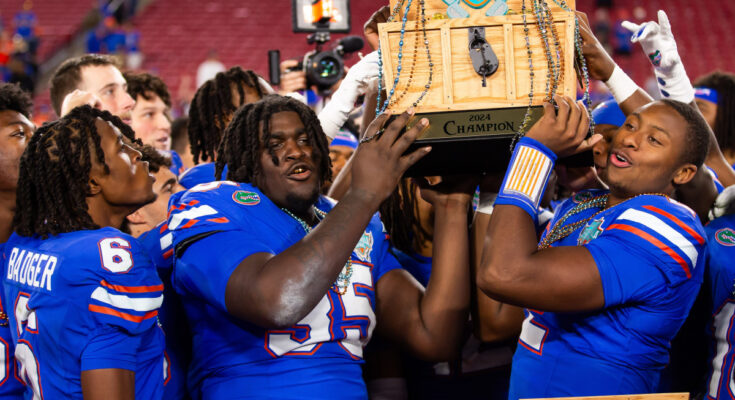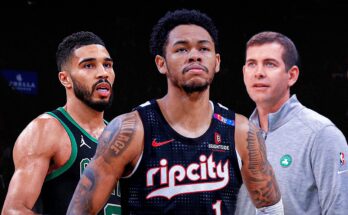Florida Gators’ 2025 College Football Playoff Hopes May Ride on Outcome of High-Stakes Rivalry Clash That Could Define the Season
As the 2025 college football season approaches, the Florida Gators find themselves in an increasingly familiar position: talented, promising, and surrounded by questions. Under the guidance of head coach Billy Napier, the program has made measurable strides in roster development and depth, but the bar in Gainesville isn’t just about improvement—it’s about contention. This year, for the first time in a decade, there’s genuine belief among fans and analysts that Florida could return to the College Football Playoff conversation. But there’s a catch, and it’s a significant one. That playoff path may all come down to a single, critical rivalry game that could define the Gators’ season—and perhaps the direction of the program itself.
Every college football team has a turning-point moment on its schedule, and for Florida in 2025, it’s not hard to spot. All eyes are focused on the annual clash with the Georgia Bulldogs, a rivalry that has long served as a measuring stick for both programs. More than tradition and bragging rights, this matchup now carries enormous postseason implications. For Florida to break into the playoff picture, beating Georgia is no longer optional—it’s essential. The Bulldogs remain one of the SEC’s juggernauts, a perennial powerhouse with multiple playoff appearances and national titles under Kirby Smart. They are the team to beat, and until someone knocks them off their pedestal in the SEC East, the road to Atlanta and beyond will continue to run through Athens.
The Gators know this, and internally, the message has been clear: 2025 has to be different. Last season’s loss to Georgia was not only decisive on the scoreboard, but also psychologically telling. Florida was physically outmatched at the line of scrimmage, struggled to generate explosive plays, and lacked the defensive resistance needed to slow Georgia’s multi-dimensional attack. In the months since, that loss has served as both a lesson and a motivator. It’s influenced recruiting decisions, offseason training regimens, and spring game adjustments. Everything Napier and his staff have done is being filtered through one question: can we beat Georgia?
Florida’s hopes don’t rest solely on that game, of course. The 2025 schedule features plenty of potential pitfalls, including road tests against Tennessee and Texas A&M, a home showdown with LSU, and the ever-dangerous finale against Florida State. But none of those matchups carry the same playoff leverage or symbolic weight as the showdown with the Bulldogs. In a new 12-team playoff format, losing a single game doesn’t automatically disqualify a team from contention—but beating Georgia could all but guarantee Florida a spot, especially if it propels them into the SEC title game with momentum.
To pull it off, the Gators will need to be nearly flawless in execution. Offensively, much of the pressure will fall on the quarterback, whether that’s a returning starter or a new face under center. Napier’s offensive system requires smart decision-making and balance between the run and pass, something that was inconsistent last season. The addition of several key offensive linemen through the transfer portal is expected to solidify protection and open up rushing lanes for a talented backfield. Wide receiver play will also be crucial—Georgia’s secondary has been elite in recent years, and beating them requires receivers who can win one-on-one battles and stretch the field vertically.
Defensively, the Gators must close the physical gap that’s existed between them and Georgia in recent matchups. That begins up front, where players like transfer lineman Brendan Bett are expected to provide immediate impact. Florida’s ability to disrupt Georgia’s rhythm at the line of scrimmage could determine the outcome. In past years, the Bulldogs have won by controlling the trenches—wearing down defenses with a punishing run game and creating clean pockets for their quarterbacks. If Florida can challenge that formula, even occasionally, it will shift the dynamic of the game. Defensive coordinator Austin Armstrong has emphasized speed and aggression in his schemes, and the 2025 unit has the personnel to execute that vision. The question will be whether they can sustain it against a team as deep and well-coached as Georgia.
Special teams may also prove pivotal. In rivalry games, where emotion runs high and momentum swings are frequent, a single missed kick or botched return can change everything. The Gators are fortunate to have kicker Trey Smack returning, a veteran whose calm demeanor and leg strength make him one of the top specialists in the country. Having that kind of reliability in close games is a luxury few programs enjoy, and Florida will likely need him in what promises to be a tightly contested matchup.
Mentally, the Gators must prove they can handle the pressure that comes with playing for everything. One of the biggest differences between a good team and a great one is how they perform when the stakes are highest. Georgia has consistently demonstrated that ability under Kirby Smart—they don’t just show up for big games, they dominate them. For Florida, the challenge is not just about playing up to the moment, but rising above it. That will require leadership from veterans, trust in the coaching staff, and a locker room culture that believes in its ability to win.
What makes the 2025 meeting even more significant is its timing. Slotted in the heart of the season, it will act as a pivot point. A win could catapult Florida into the top tier of the rankings, giving them momentum and national credibility heading into the final stretch. A loss, on the other hand, could derail playoff hopes and reinforce the perception that Florida isn’t ready to reclaim its place among the SEC elite. This isn’t just a rivalry game—it’s a referendum on progress.
The importance of this game has not been lost on Florida’s fan base either. There is growing anticipation in Gainesville, with ticket sales surging and social media buzzing about the team’s playoff chances. Napier’s third season feels like a defining moment for both him and the program. While boosters and alumni are encouraged by his recruiting wins and infrastructure upgrades, results on the field will ultimately determine his long-term standing. Beating Georgia, and potentially reaching the playoff, would answer a lot of questions.
Looking at the broader landscape, the expanded playoff format gives more teams a realistic shot at the postseason, but it also raises the standard of what it means to be elite. Winning 10 games might get a team into the conversation, but signature wins—especially against fellow playoff contenders—will carry more weight than ever. For Florida, the Georgia game is that signature opportunity. It’s a chance to signal to the rest of the country that the Gators are not just rebuilding, but returning.
There’s also a psychological component to all of this. For the last several seasons, Georgia has owned the rivalry. The Bulldogs have not only beaten Florida, but in some years humiliated them, asserting dominance in a way that leaves no doubt about who controls the East. That kind of pattern can wear on a program. Reversing it requires more than talent—it demands belief, execution, and a refusal to accept the status quo. If Florida can change that narrative in 2025, it won’t just shift the playoff picture. It could change the course of the program for years to come.
In a sport where every game matters but some matter more, Florida’s season will likely be judged through the lens of this one contest. Yes, they will need to win the other games. Yes, consistency and depth will be tested across the grueling SEC schedule. But when the dust settles, and playoff spots are handed out, it may all come back to what happens on that one Saturday afternoon in Jacksonville. Win it, and the path is open. Lose it, and the climb gets steeper.
For Florida, the challenge is immense. But so is the opportunity. The 2025 Gators don’t just want to compete—they want to contend. And to do that, they must conquer the one opponent that has stood between them and greatness. One rivalry. One game. One chance to change everything.



